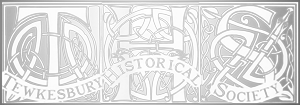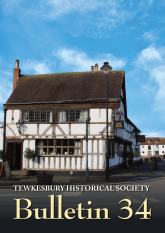Tewkesbury's Early Freemen
In modern times, the award of the freedom of a borough, town or city is a symbolic honour, bestowed by the donor on its recipient as a mark of esteem and respect, usually celebrating some service which the new freeman has given to the donor authority or to the country at large. In earlier days, however, admission to civic freedom was an important step in a citizen's life, carrying with it benefits, rights and responsibilities.
In 1575 Tewkesbury became incorporated as a Borough by Charter, thus putting its government on a more formal and official footing than had before obtained. The town had had, of course, earlier charters and was already virtually self-governing since some structure of administration would have been essential to preserve good order and to oil the progress of business. It is probable, therefore, that incorporation merely endorsed and regularised the status quo.
It seems that Robert Dudley, Earl of Leicester, sometime favourite of Queen Elizabeth, played some part in the arrangements for the conferring of the charter on the town for, in the borough records for that year, we read:
‘This yeere in the time of Thomas Perkins & Thomas Geest, being baylifles, the towne sent a great Oxe to Kenelworth castell to be presented to the earle of Leister being high steward who had procured the towne to be incorporate which axe was 17 handfull hye and in length from head to tayle 26 handfull & 3 inches and cost £14, for which the whole towne was levied and gathered, As also the yeere before, Roger Malliard and Robert Tumbell being bailifies, the said Earle was presented with a fayer Cuppe silver guilt which cost £16 for which the towne was also levied’
One wonders if the splendid animal was put to work on the Earl's estate or, maybe, used to provide some of the beef needed to feed the multitude during the visit of the Queen and her entourage to Kenilworth which took place in the summer of 1575, lasted for almost three weeks and is reputed to have cost the Earl over £60,000!
Following the town’s incorporation, its formal administration was regularised, its government consisting of elected officers - two Bailiffs, two Constables, two Sergeants and a Chamberlain, each serving for a year - and a Council of twelve chief burgesses. One of its first acts was to generate, agree and publish a set of Ordinances, one of which defined the role of Freemen and ruled that only Freemen of the town would be permitted to carry on business in the town.
It seems probable that, at the same time, all the existing reputable traders and craftsmen were admitted as Freemen. Certainly the records show that some 253 burgesses became Freemen in 1575 and were not required to pay for the privilege although, thereafter, almost all who were admitted as Freemen were required to pay. The Ordinances allowed that the eldest son (but not younger sons) of an existing Freeman had an automatic right of admission as a Freeman on payment of a fine of twelve pence, as also had apprentices on completion of their seven years indentures, for the same sum. In the case of almost all other admissions after 1575, payment was required, the fine being set, maybe, according to the means of the applicant or, maybe, according to the need within the town for the particular skill which the applicant had to offer. The cost of admission, generally, lay between five shillings and two pounds, but fines of several pounds and more did occur from time to time. For example, John King, a maltmaker, paid as much as £10 in 1613 for his admission. Maybe there were already sufficient maltmakers in the town at that time and maybe they insisted that the newcomer pay through the nose for the privilege of competing with them! Free admission, however, did still occur, although not very often. In the twenty-five years following the year of incorporation, 413 burgesses successfully sought Freedom of the Borough, but of these only 41 were admitted free of charge, 31 of them in the four years immediately following incorporation.

In most cases the records included the occupation of the new admissions, and an analysis of the ‘free' admissions in 1575, which, it is reasonable to assume, comprised the whole complement of the town’s craftsmen and tradesmen at that time, gives a good idea of the distribution of occupations. Of the records of the 253 new admissions, 50, or about 20%, do not include the freeman’s occupation and one is described as ‘yeoman’. The remaining 202, however, break down as the table here shows:
Allowing that the 20% of Freemen whose occupations were unstated were spread broadly statistically across the sample, it is reasonable to assume that, proportionally, the table represents pretty well the level and diversity of trades in the town at that time.
That the list should be headed by those in the footwear business is surprising, bearing in mind that the town also boasted two cobblers. It is inconceivable that a town of a population of between 1,500 and 2,000 souls could provide enough custom for them, and one must assume that their business extended throughout the county and, perhaps, even further afield. Interesting, also, is the comparatively large number of people involved, in one way or another, with cloth. Tailors, weavers, glovers, tuckers, drapers and cappers seem to be represented in numbers well in excess of what the town itself needed.
The remaining trades are at a level that one might expect in a thriving town at the junction of two busy rivers, and possibly served the local community only. Quite how the sole ‘sklatter’ served the community is, however, something of a mystery! Even the figure of 26 maltmakers does not seem excessive, bearing in mind that, in the seventeenth century, beer was the beverage that almost everyone drank. Whilst the town boasted a few brewers and innkeepers who would have been brewing on a fairly large scale, by far the most beer would have been produced on a domestic basis. Unfortunately, almost no sixteenth century probate inventories for Tewkesbury have survived, but those for other towns of similar size list brewing equipment in a large proportion of households and there is no reason to suppose that Tewkesbury would have been any different. The process of maltmaking is fairly complicated, needs space and is time-consuming. It is likely, therefore, that householders would prefer to buy malt for use in their domestic brewing rather than to make it.
A trawl through the records for the same period in search of family patterns is unrewarding. Parents seem, generally, to have apprenticed their sons to masters in trades other than their own. Of the 159 apprentices admitted to freedom up to the end of the century on completion of their seven-year term of apprenticeship, only twelve had been apprenticed to their fathers. On the evidence of the comparatively short period examined, 1575 to 1600, there is nothing to suggest any family tradition in any particular trade. A different conclusion, however, might well emerge from, say, a complete century’s study.
Finally, in the same twenty-five year period to the end of the century and amongst the total of 666 admissions, it is refreshing and a little surprising to find four women. Two were described as spinsters and were charged two shillings and ten shillings respectively for admission, whilst the other two were listed as widows, one being charged three shillings and Sixpence and the other being admitted free of charge. Only of Margery Cole is the occupation shown. She is recorded as having been a draper and apprentice master to John Tommes when he completed his indentures and was admitted a Freeman in 1582.


Comments